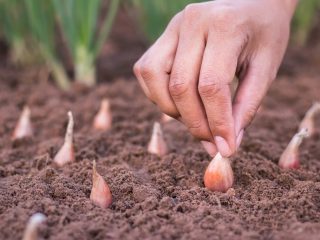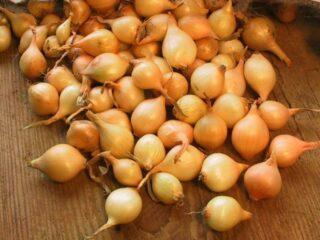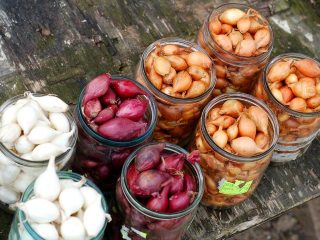Content
Hydroponic green onions are a good way to grow crops in small areas: in a closed greenhouse, apartment, in a courtyard. Thanks to the short growing season, fresh greens can be harvested every month.
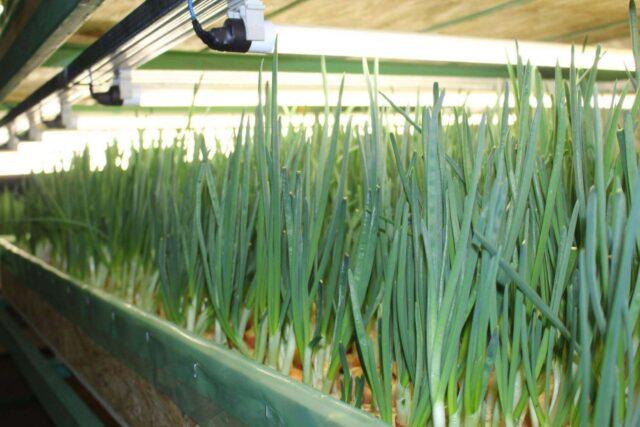
Growing green onions hydroponically is easy and fast even for novice gardeners
What is hydroponics
Growing plants without using soil is called hydroponics. With this method, the seedlings receive nutrients not from the soil, but from the environment surrounding the root system - humid-air, well-aerated water or porous, moisture-absorbing and breathable solid (gravel, crushed stone, expanded clay, vermiculite).
All these substances provide root respiration and require constant drip or just frequent watering with special nutrient mixtures prepared taking into account the needs of plants for mineral and organic elements.
Hydroponics makes it possible to regulate the process of growing plants:
- to ensure proper nutrition of the root system and vegetative parts, which will fully meet the needs of the crop for nutrients;
- regulate the content of carbon dioxide in the environment in an amount acceptable for the process of photosynthesis;
- maintain the desired temperature, as well as air humidity;
- provide comfortable lighting and daylight hours.
All this allows you to create ideal conditions for growing crops and get a good harvest of environmentally friendly vegetables in a short time.
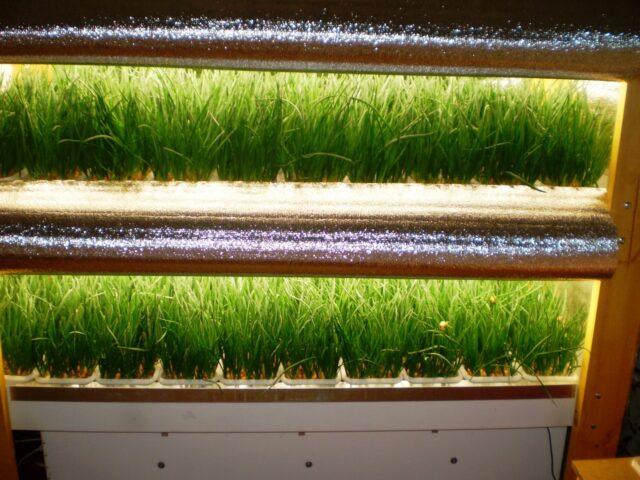
In hydroponics, you can grow greens in several tiers.
Benefits
Like any other indoor growing method, hydroponics has its advantages and disadvantages.
Benefits:
- saving space;
- high productivity;
- 100% assimilation of nutrients by plants;
- no need to use pesticides and herbicides;
- high viability of the resulting planting material;
- saving water and nutrients;
- the ability to monitor the state of the root system;
- year-round growing of plants;
- low labor intensity in comparison with cultivation in the soil (there is no need to loosen the ground, remove weeds, fight pests).
disadvantages
Despite all the advantages, this cultivation method has and disadvantages:
- the risk of losing crops if the growing conditions are violated;
- the need for constant support of a certain microclimate;
- the impossibility of growing some crops in hydroponic installations, in particular, root crops;
- the need to buy expensive equipment.
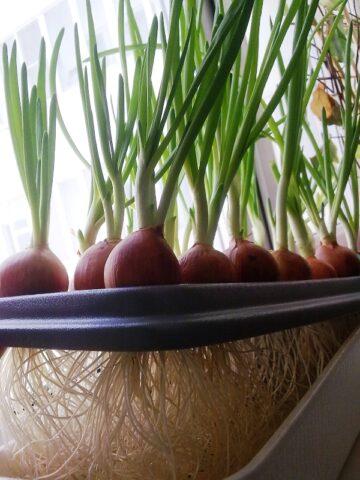
Hydroponics has more advantages than disadvantages
Methods for growing onions on a feather in hydroponics
There are three ways to grow onions hydroponically. They differ from one another in the type of growing environment and the rules of care.
Air
When forcing an onion onto a feather by this method (aeroponics), its root system is in an empty dark reservoir, that is, in the air. Such crops are fed by spraying the roots with an aqueous solution of a special mixture.
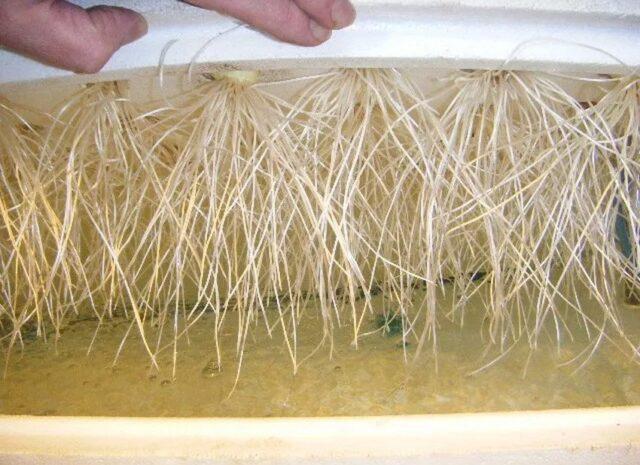
Aeroponics provides for regular moisture to the roots
Water
The traditional method of cultivating onions in hydroponics is water, in which the roots are dipped in a specially prepared nutrient solution.
For normal growth and development of onions, the aquatic environment in which the culture resides is regularly enriched with oxygen. In production on an industrial scale, special compressor installations are used for this purpose, and for cultivation at home, a small aquarium compressor can be dispensed with.
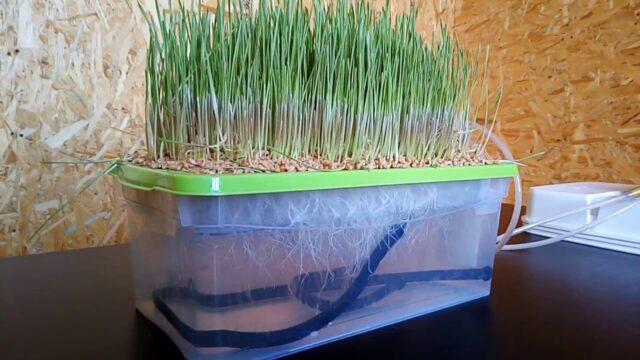
Oxygen supply ensures respiration of the root system
Substrate
This hydroponic growing method involves submerging the roots in a moist substrate. As the latter, crushed stone, gravel, vermiculite, expanded clay, sawdust, peat, moss, hay are used. The basic rule of caring for plants in this case is to maintain the necessary humidity of the environment in which the roots are located.
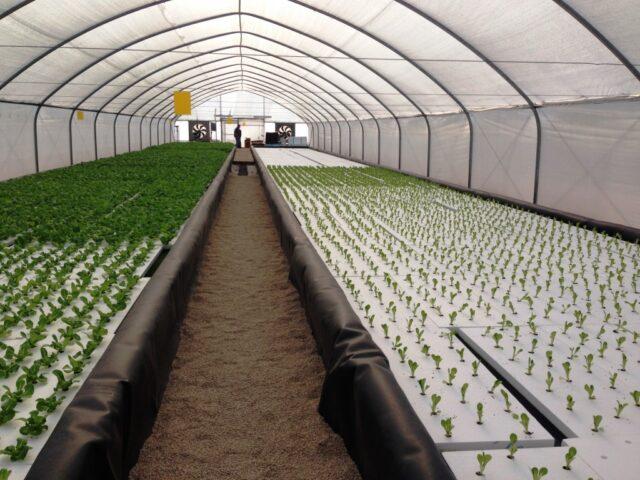
The substrate for hydroponics should be light and permeable.
Which onion varieties are suitable for hydroponic distillation?
For hydroponics, separate forcing varieties are used. The list includes:
- Spassky;
- Ural family;
- Union;
- Seryozha;
- Strigunovsky;
- Bessonovsky.
Productivity largely depends on the number of primordia. It's good if there are at least three of them. To select high-quality planting material, it is recommended to cut a couple of bulbs from a batch of the same variety and see how many buds there are.
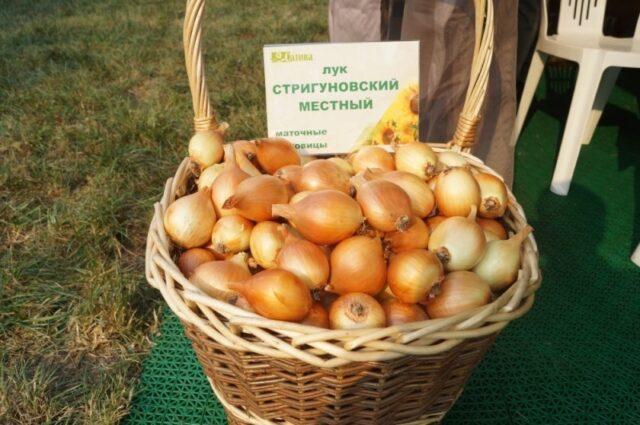
Not all varieties are grown hydroponically, Strigunovsky is one of the suitable options
How to grow onions hydroponically
The process of growing onions hydroponically is not particularly difficult. Nevertheless, certain rules of agricultural technology will still have to be observed.
Preparing the bulbs
Planting material for forcing onions on a feather in hydroponics is best selected from the harvest of last year. The diameter of the prepared bulbs must be at least 2 cm and no more than 4 cm. In addition, they must be free of traces of disease and mechanical damage.
The selected bulbs are left for 3-5 days in a warm room, after which the top layer of dry husk is removed and bubbled, that is, saturated with air.
For this:
- 1 kg of planting onions is poured with 10 liters of warm water (+ 38-40 ° C).
- On both sides of the container with onions, heating pads with hot water are attached with tape or rope.
- Dip the aquarium compressor into a dish with soaked planting material and turn it on.
The bubbling process should last at least 15 hours without interruption.
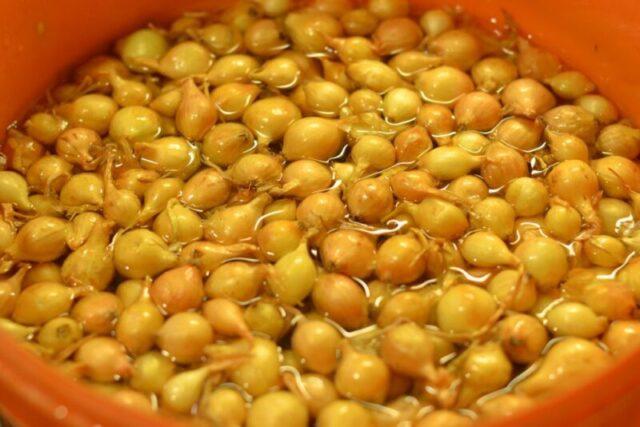
Soak the onion before planting.
Preparing the container
The choice of container depends on the amount of material prepared for laying. On an industrial scale, gardeners use a professional hydroponic system to grow onions. When distilling for home use, you can get by with a ready-made plastic container, which consists of a water tray and a lid with cells, or make a container yourself.
To make it you will need:
- plastic container with a tight-fitting lid, approximate dimensions - 80x40x20 cm;
- a small compressor for an aquarium;
- two lamps;
- two pieces of PVC pipe with small holes made in them, a knife.
Work algorithm:
- Cut holes on the lid with a sharp knife so that they are about 50 (10x5 cm).
- Additional holes are made for tubing that will connect the container to the aquarium compressor.
- Close the container tightly with a lid.
- With the help of pipes and a compressor, air is supplied to the sump.
- Fill the pan with water (about 3/4) through the upper holes and insert the prepared onions.
- Hydroponics is placed near the outlet, lamps are installed above it.
In hydroponics, you can plant green onion seeds for seedlings.To do this, they are laid out in special cassettes with a wet substance and left until shoots appear. When the height of the shoots reaches 7 cm, the seedlings dive to a stationary place.
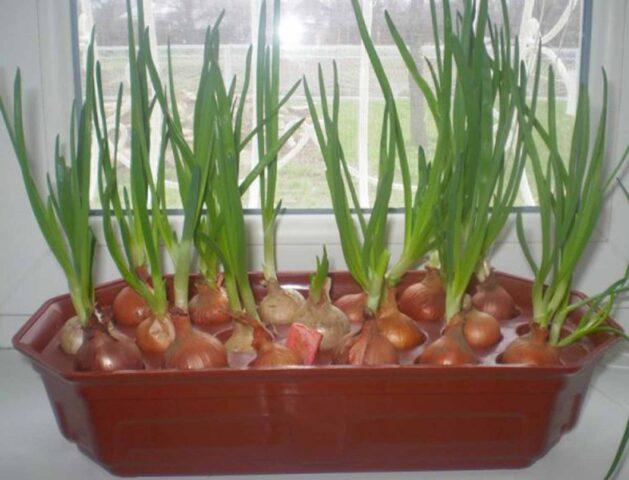
For forcing onions, a regular seedling container is suitable.
Disembarkation scheme
The scheme for planting an onion on a feather is simple:
- Pour water or nutrient solution into the tray.
- Cut off the top of the bulbs (this will speed up their germination).
- Place the bulbs in special cells with the bottom down.
Place the filled container in a dry and warm place.
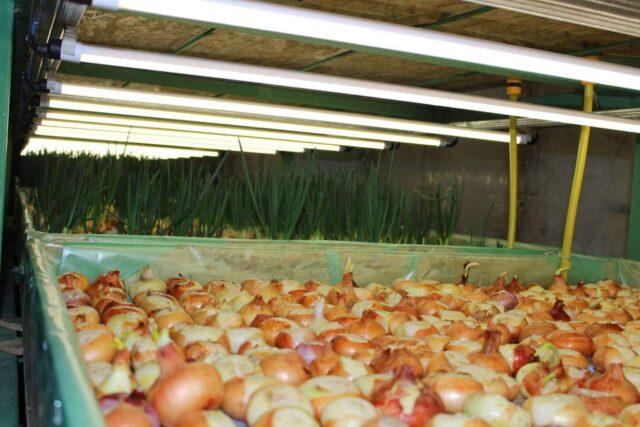
The bulbs are laid out at a short distance from each other.
Features of growing green onions in hydroponics
The quantity and quality of a green feather directly depends on the conditions of its agricultural technology. Therefore, it is very important to provide plants with the correct microclimate, nutrition and comfortable lighting.
Temperature
One of the important conditions for forcing onions on a feather in hydroponics is maintaining the correct microclimate. The air temperature during the entire growing season should be + 25-28 ° С. Overheating or hypothermia of plants can slow down their growth, and sometimes even die.
Shine
Green onions do not require bright light. If the container is located in a well-lit place (on a balcony, veranda or windowsill), it is not necessary to install additional lamps.
When growing onions on a feather in an insufficiently well-lit room, in order to avoid stretching, you will have to illuminate the plants using special phytolamps or ordinary fluorescent lamps. When the length of the shoots reaches 15-20 cm, additional lighting can be removed.
Nutrient solution
It is permissible to grow green onions on a feather in ordinary water. However, excellent quality greens can only be obtained with the use of special nutritional mixtures.
A solution for onions in hydroponics must have the correct pH and contain a strictly defined amount of mineral elements. Therefore, unlike professional gardeners who can cook it on their own, novice gardeners are advised to purchase the finished product in specialized stores.
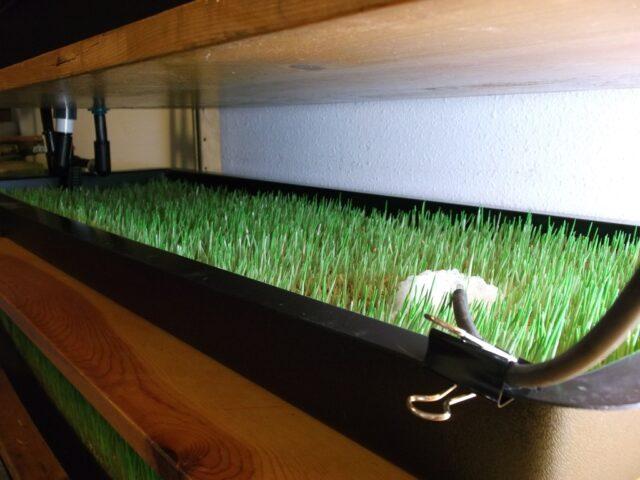
Hydroponic plants need the right temperature
Care rules
Caring for green onions in hydroponics is not particularly difficult and includes:
- Regular hydration of the root system. The hydroponic plant for growing onions on a feather provides two methods of irrigation - regular flooding, in which the root system is dipped into the nutrient mixture for a certain time, and drip irrigation, which provides for uniform moisture of the substrate.
- Aeration. During the entire growing season, onion roots are saturated with oxygen every day. When using industrial hydroponic plants, this procedure is performed automatically. At home, you can use an aquarium compressor to aerate the roots.
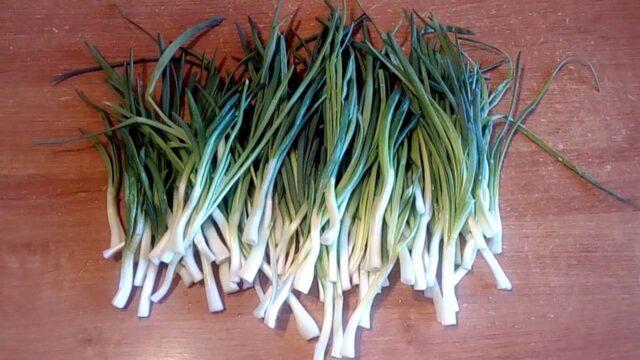
At the stage of full maturity, the length of the feather is 25-30 cm
Harvesting
Provided proper agricultural practices, green onions reach full maturity 20 days after planting. The degree of readiness is determined by the state of the vegetable - it becomes soft.
During the harvesting process, the used bulbs are removed from the cells, the old peels are removed and the roots are removed with a sharp knife.
Conclusion
If you grow green onions hydroponically in accordance with the rules of agricultural technology, you can get a good harvest throughout the year. The finished product yield is approximately 80% of the mass of the planting material.
